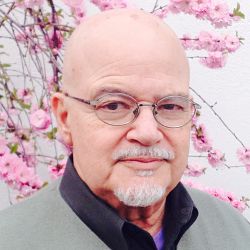Madeleine Festival Award goes to Mauricio Mixco
Friday, May. 22, 2015
SALT LAKE CITY — A summer job planted a seed that later lead Mauricio Mixco to devote almost 40 years to documenting American Indian languages in danger of extinction.
Before entering college, Mixco taught Spanish to Peace Corps volunteers in New Mexico; he also went with them to an Apache Indian reservation, teaching them to work with native populations. Along the way, he learned some of the native language.
After those few weeks, Mixco, a native of El Salvador who became a United States citizen when he was 19, headed to the University of California-Berkeley, where he planned to major in French and Spanish literature.
However, after taking a few courses in linguistics at Berkeley, Mixco decided to change his major, even though it meant an extra year of study. His wife, who was expecting their first child, “encouraged me to do what would make me happy, and I did, and never regretted it,” said Mixco, who at times worked three jobs to support his family while he earned first an undergraduate degree and later a doctorate in linguistics.
Mixco, now a professor emeritus of linguistics of the University of Utah, describes the field as “trying to uncover the hidden patterns in daily speech. … There is a systematicity that can be discovered through analysis, but it also has to be discovered through very accurate observation and description of the actual use of the language.”
As a doctoral student, he began to document Kiliwa, a language spoken in Baja California. From 1966 to 1986, he spent his summers documenting Kiliwa and other languages spoken in Baja California. Then, at a colleague’s request, in 1993 he began a study of Mandan, a Siouxan language spoken in North Dakota.
Like Kiliwa, Mandan is in danger of extinction because younger generations aren’t learning it, Mixco said. All of the Kiliwa speakers he worked with now are dead, while there is only one person who speaks fluent Mandan, he said.
In about 2000, he began to work in Utah with the Shoshoni language, arranging to transcribe and translate the work of a colleague, Wick R. Miller, who in the 1960s and 1970s “taped 120 tapes of narratives, of stories, myths and legends and personal recollections of the history of the various communities within that language group,” said Mixco, who retired in 2010.
He and his wife, Teresa, are Saint Catherine of Siena Newman Center parishioners and have been active in the Catholic Hispanic community.
“Whatever work we’ve done here in the diocese ... has always been with Teresa as a partner, and in fact as a leader,” he said. “She has been my inspiration all my life, and the work that we’ve done together was really under her motivation.”
When the couple came to Utah in 1973, the Spanish-speaking community was quite small but growing, “and their needs within the Catholic Church were different from the needs within the general community because of the culture and the language, which kept them from participating fully in religion,” he said.
“They would go to Mass regularly, and they would participate in the liturgies, but a lot of them didn’t really control English very well, so they were left out of a lot of things.”
The couple advocated for Spanish liturgies to be introduced into the parishes, becoming members of the diocesan Hispanic Advisory Council under Bishop Joseph L. Federal. At the parish level, Mixco is a lector and a member of the men’s group.
Teresa is a Mass coordinator, lector and Extraordinary Minister of the Holy Eucharist. In addition, the couple is involved with the parish’s “Good News People” program and the Art & Environment Committee.
The couple has three children, one of whom is a member of the diaconate formation class that is expected to be ordained in 2017.
Glenn Olsen, a member of the Madeleine Festival Award selection board, nominated Mixco for the award because, in addition to Mixco spending his lifetime preserving dying languages, “I was taken by how much he is turned to by his own graduate students – the people who worked with him really liked him and found him to be very encouraging in their work,” Olsen said.
WHAT: Madeleine Award Dinner
WHERE: Alta Club, 100 E. South Temple, SLC
WHEN: Wednesday, May 27; social at 6 p.m.; dinner at 7 p.m.
Cost: $55 per person. RSVP to Patricia Wesson, 801-328-8941 ext. 108 or emailpwesson@utcotm.org.
For questions, comments or to report inaccuracies on the website, please CLICK HERE.
© Copyright 2024 The Diocese of Salt Lake City. All rights reserved.
© Copyright 2024 The Diocese of Salt Lake City. All rights reserved.


Stay Connected With Us